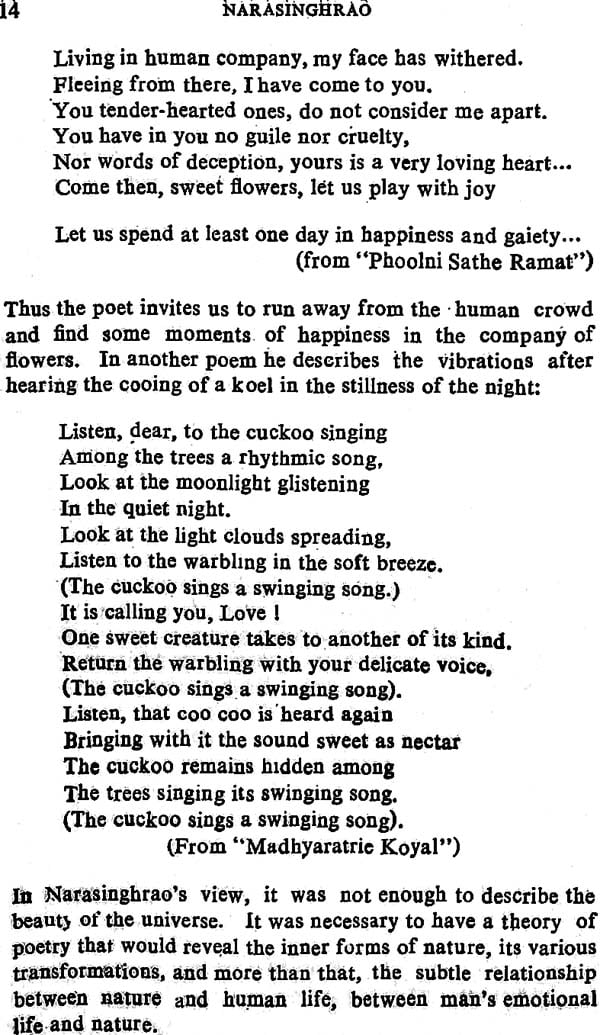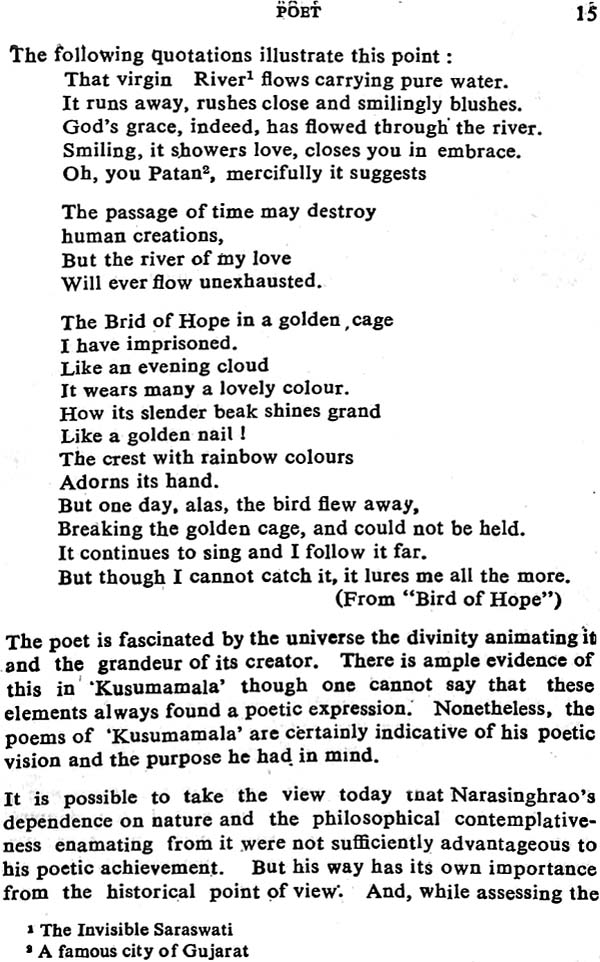
Narasinghrao - Makers of Indian Literature (An Old and Rare Book)
Book Specification
| Item Code: | NAP172 |
| Author: | Sundarji Betai |
| Publisher: | Sahitya Akademi, Delhi |
| Language: | English |
| Edition: | 1985 |
| Pages: | 71 |
| Cover: | Paperback |
| Other Details | 8.5 inch X 5.5 inch |
| Weight | 130 gm |
Book Description
Narasinghrao (1859-1937), poet, critic and philologist, is hailed as the ‘Bhisma Pitamaha’ of Gujarati literature.
His poetry reveals the deep sensitivity with which he responded to nature and man. He infused Gujrati poetry with vigour and refinement, variety of sentiment, and a certain philosophical content.
His literary criticism covers appreciation of poetry, metrical composition, use of language, its growth and development and other literary concepts.
Sundarji Betai (b. 1905), distinguished poet, critic and scholar in Gujrati, was a student of Narasinghrao. He taught at the S.N.D.T. University, Bombay, and has been honoured for his writings. He wrote this monograph in Gujrati for the common reader.
Sarala Jag Mohan has rendered it from Gujrati for the benefit of the non-Gujrati reader.
Many individuals have made memorable contributions to the cultural development of modern Gujrat. Of particular significance is the contribution of the literary stalwarts of the last century and the beginning of the present century. One of these outstanding figures of what is popularly known as the age of scholars (pandit yuga) was Narasinghrao Bholanath, who was born on September 3, 1859 and passed away on January 14,1937.
Narasinghrao has been rightly described as the Bhisma Piamaha of Gujratiliterature. His lifelong devotion to literature and learning was something remarkable for one whose official duties as a district collector claimed much of his time. What he wrote and thought and conveyed through many of his lectures on literary and linguistic/philological subjects was of immense importance. Fat from being of mere historical value, Narasingharao’s writings have a lasting significance from the point of view of the growth and development of modern Gujrati literature. Whether in creative writing or literary criticism, philological study or even translation, Narasinghrao has made solid contribution. He brought about a certain maturity influenced succeeding generations of poets and prose writers.
He was the son of Bholanath Sarabhai who was deeply religious and had an enlightened awareness. In the constricting atmosphere of 19th century India, no person with such social awareness could avoid being social reformers of his time. Narasinghrao had inherited his father’s sensibility and turned out to be a votary of truth.
Thus, innate, inherited and acquired traits combined in Narasinghrao to become the elements of truth, beauty and goodness. His life and works provide ample evidence of these traits and elements. They also bear testimony to his firlm insistence on correctness not only in matters like pronunciation and spelling. But also in matters of broader human importance Being correct was his guiding principles in writing as well as his general behaviour, which was marked by warm qualities of heart.
If Narasinghrao was a great scholar, he was an equally great teacher. He joined as professor of Gujrati in the Elphinstone College at Bombay after his retirement from government service. Those who studied under him were deeply impressed by his learning and warm affection which often alternated with terrible fits of temper.
Narasinghrao’s treatises are a living evidence of his tireless efforts to understand and explain. His poetry, though not always at grand heights of achievement, reveals the deep sentivity with which he responded to nature and man. In his ‘Rojnishi’ (Diary) and character sketches of people he knew at different stages of his life we see Narasinghrao’s capacity to feel intensely.
Life had given Narasinghrao many blows. His beloved and talented children ad his very loving wife had departed one by one, leaving him behind to mourn their death. These blows had rudely shaken him. At the death of his wife particularly, he momentarily lost his forbearance and cried out, “I wish shot dead!” But with each blow, his faith in God strengthened, as is evident in his poetic creations on these occasions. Some and poignancy that people sing them even today.
Narasinghrao never compromised on principles and did not hesitate crossing swords with his contemporaries. The fiery controversies between him and an equally firm-headed scholar and poet, Balawantrai Thakore, are well known to students of Gujrati literature. Both stood firm on their chosen grounds. But it left no bitter taste in the mouth of either combatant. On the contrary, both had respect and regard for each other.
He devoted his time and energy to the enrichment of Gujrai literatue and language till his last days. He was indeed a great literary phenomenon of his times and has left not only an indelible mark on modern Gujrati literature but has been a lively influence on it.
Contents
| Introduction | 7 |
| Poet | 10 |
| Writer of Creative Prose | 26 |
| Critic | 42 |
| Philologist | 52 |
| Conclusion | 56 |
| Appendix I | 58 |
| Appendix II | 62 |
| Appendix III | 63 |
| Appendix IV | 64 |









